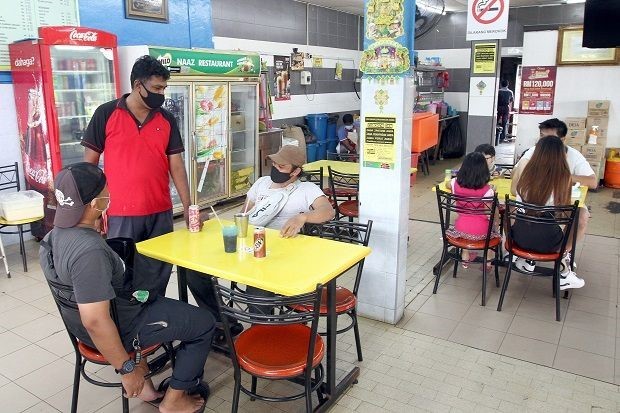
Image credit: The Star
PETALING JAYA: Restaurants and eateries in several cities are seeing a surge in patronage since the conditional movement control order took effect on March 5.
Effects from the relaxation were immediately felt with more dine-ins and reservations.
However, there were now some concerns over the RM10,000 fine on those who violated the standard operating procedure.
The Pan Malaysia Koo Soo Restaurants & Chefs Association vice-president Datuk Ringo Kaw said eateries in the Klang Valley were seeing positive increase in patronage, especially during weekends.
“Although interstate travel is still not allowed, people are utilising the opportunity to gather with their loved ones.
“Many are also making plans to see their family before Ramadan begins next month. This is a good sign and we hope things will improve further, ” he said.
Lai Chong Haur, a director with Seven Tea One Kitchen For Good, said orders for his cafe’s packed food, cookies and cakes started to pick up.
“Corporations are able to organise in-house events now under the conditional MCO.
“That’s why food and gifts are in demand, ” he said, adding that he was able to employ 22 youths in his social enterprise.
Malaysia Singapore Coffeeshop Proprietors’ General Association also said its members have generally experienced an increase in business.
Its president Datuk Ho Su Mong, however, expressed concern over the RM10,000 fine, which he described as “too hefty”.
“This certainly affects businesses and patrons’ confidence as proprietors can be fined RM50,000 for breaching the SOP, ” he said.
Citing the example of a member who was recently fined for providing foamy hand sanitiser at his premises, Ho said businesses kept hearing different rules from enforcers.
“I hope the National Security Council and relevant authorities will make every instruction clear to enforcers and also the people, ” he said.
In GEORGE TOWN, patrons flocking to hawker centres were delighted to be able to finally eat out.
At Sri Weld Food Court, accounts executive Anne Yong, 25, said she was happy to return to hawker centres for a proper dine-in experience.
“Many of us work around the area and we have been ordering takeaways for the past month.
“I really miss eating out with friends, family and colleagues, ” she said when met yesterday.
Joey Mooi, 22, who got into the habit of taking away food, said although takeaways were a safer alternative, she still eats out sometimes.
‘’We usually try to avoid crowded areas because I do not like to squeeze in confined spaces with other people.
“I choose to eat out occasionally because it is better for the environment. With takeaways, so many plastic bags and containers are used, ’’ she said.
A coffee shop assistant, who wanted to be known as Ong, 50, said business had picked up as compared to during the MCO period.
“This is better for us, especially those in the beverage businesses because we need dine-in patrons, ” she said.
In JOHOR BARU, business at Indian Muslim restaurants has improved.
Johor Indian Muslim Entrepreneurs Association secretary Hussein Ibrahim said on average, outlets recorded about 70% increase in business.
He said daily earnings plummeted by about 75% when MCO 2.0 was imposed on Jan 13.
He said shorter business hours during MCO 2.0 also affected business.
Hussein is now hoping that the government will consider allowing the 24-hour Indian Muslim restaurants to operate at least until 2am daily during the conditional MCO period.
“Business is good in the evenings as the majority of our customers like to come with their families and friends to enjoy their teh tarik, roti canai or mee goreng mamak, ’’ he said.
Source: https://www.thestar.com.my/news/nation/2021/03/16/eateries-enjoying-brisk-business

